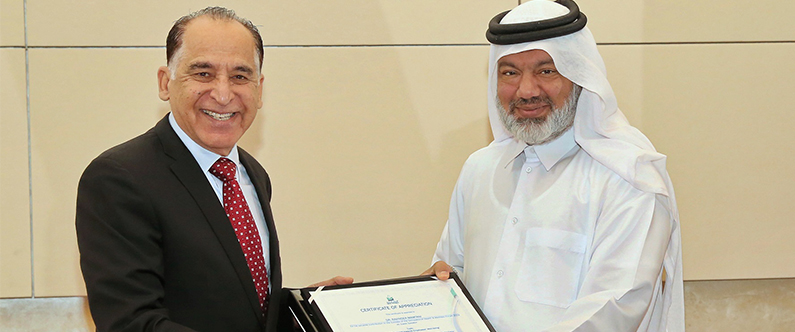IPH brings lifestyle medicine to the community
 Dr. Ravinder Mamtani received a certificate of appreciation following his talk at Qatar Petroleum.
Dr. Ravinder Mamtani received a certificate of appreciation following his talk at Qatar Petroleum.
Faculty from Weill Cornell Medicine – Qatar have been getting out into the community to help educate people about healthy lifestyle habits.
The team from the college’s Institute for Population Health visited Kanjani Hall Integrated Indian Community Center to speak to the Indian Women’s Association on the subject of Being Food Smart: Let’s Get it Right! Dr. Sohaila Cheema spoke about healthy eating and the importance of reducing the amount of fat, sugar and highly refined carbohydrates in food in order to prevent obesity and associated illnesses like heart disease, diabetes, high blood pressure and cancer.
Drs. Sohaila Cheema and Sathyanarayanan Doraiswamy from IPH also visited Newton British Academy – Barwa City, speaking to 400 primary school students, and then 150 secondary school students, about the importance of road safety. Topics included the wearing of seatbelts – which is compulsory in many countries and are proven to save lives – the importance of adherence to speed limits and the dangers of speeding, and using mobile telephones while driving. Although the children they spoke to are not yet old enough to drive, it is hoped the lessons they learn now will become ingrained so when they do drive, they will not fall into bad habits. The IPH team also hopes that the children will have a positive effect on their parents and relatives, so helping to address poor driving habits that adults display.
Dr. Ravinder Mamtani, vice dean for student affairs-admissions, population health, and lifestyle medicine, was also promoting healthy lifestyles after being invited to speak at two high-profile events.
On November 14 he was asked to address the Doha chapter of the Institute of Chartered Accountants of India on the subject of Lifestyle Medicine: An Inspirational Trend for Optimum Health, while later in the month he spoke at an occupational health forum hosted by Qatar Petroleum on the topic Lifestyle Medicine and Its Promise in the Workplace. By supporting lifestyle medicine, businesses and organizations are able to improve the health and safety culture within the workplace and help in reducing the incidence of chronic conditions. This way the industry can further its goals of promoting the health and productivity of workers.
Dr. Sohaila Cheema, director of the Institute for Population Health said the events had been very worthwhile.
Dr. Cheema said: “The way we live our lives has a direct impact on our health, and medical professionals worldwide are placing increasing importance on addressing lifestyle factors. We know that poor diets and a lack of exercise can lead to non-communicable diseases; illnesses like obesity, diabetes and cancer. If we can get out into the community and remind them of the importance of taking responsibility for their own health and that of their families, we can reduce the current burden of disease and save lives. This is also true of road safety. Although not directly a health condition, the medical impact that poor driving can have on the individual and those around them cannot be overstated. Hundreds of young people die needlessly on roads every year and we urgently need to address that.”